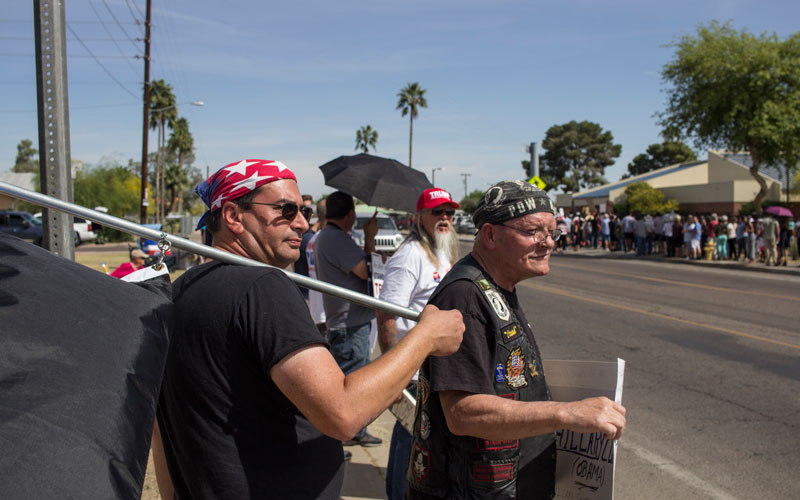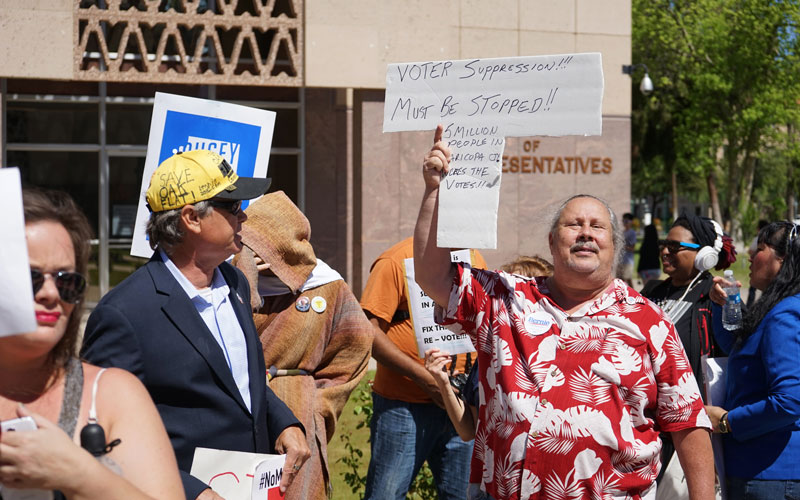
Trump supporters stand on watch at the Hillary Clinton rally at Carl Hayden Community High School in Phoenix on Monday, March 21, 2016. (Photo by James White/Cronkite News)

Richard Sitongia, a Bernie Sanders supporter, holds a sign to protest the Maricopa County Recorder’s Office and the way it handled the presidential preference election on Tuesday. (Photo by Travis Arbon/Cronkite News)
Elected officials and members of the public on Wednesday called for action after Maricopa County voters faced a night of long lines and overwhelmed polling stations during Tuesday’s presidential preference election.
Read more:
Arizona election day photo gallery
Storify: Live coverage of Arizona presidential preference election
“What happened to Maricopa County voters yesterday was awful,” she said in a statement. “I can honestly say that as of right now we have no explanation why county election officials decided to reduce the number of polling places down to only 60 locations.”
Phoenix Mayor Greg Stanton requested the U.S. Department of Justice launch an investigation into delays that left some voters stranded in line for hours after the polls were set to close.
In his letter to Attorney General Loretta Lynch, Stanton called the election a “fiasco” that “demonstrates the urgent need for an independent and thorough law enforcement investigation.”
And Rep. Jonathan Larkin, D-Glendale, called for Maricopa County Recorder Helen Purcell to resign because “voters have lost faith in her ability to conduct an efficient election,” according to a statement.
Frustration with the delays boiled over into public protests on Wednesday as well, both at the state Capitol and the Maricopa County administration building, where protesters decried the limited voting locations and called for the county to take reparative actions.
Critics blamed the county’s reduction of polling sites to 60, down from about 200 in previous primaries.
Lines at some polling places stretched out the doors and down the street, leading to wait times in excess of four hours at certain locations.
The delays meant the County Recorder’s Office did not receive reports from all precincts until about 2 a.m., despite polls officially closing at 7 p.m. Spokeswoman Elizabeth Bartholomew said on election night that some voters stood in line long past midnight.
Many of those caught in the gridlock were independent voters, who could not vote in the presidential preference election. Unlike primaries or the general election, presidential preference election voters must register with a political party to cast a ballot.
Independent voters who chose to wait in line could request a provisional ballot – that would not count – and that may have increased the wait time of the voters behind them.
State Sen. Martin Quezada, D-Phoenix, laid the blame at the feet of the County Recorder’s Office for its decision to reduce the number of polling stations. He also criticized his Republican colleagues in the state Legislature for blocking measures that he believes would alleviate voting problems.
Quezada said the state should allow independent voters to vote in the presidential preference election, and excluding them disenfranchises a large chunk of Arizona’s population.
“Their voices and their votes are just as valuable as members of the Democratic Party or Republican Party or Green Party or any of the other established parties,” Quezada said. “For us to cut them out of this election, I think did a huge disservice not only to independents, but to the rest of us as well.”
Quezada sponsored a bill in February that would allow independent voters to participate, but the legislation has languished in committees for more than a month.
Gov. Doug Ducey’s office released a statement Wednesday also calling on the state to open the presidential preference election to independent voters.
Shayna Stevens, executive director of the Arizona Students Association, attended a protest near the Maricopa County Administration building. She’s participated in registering and organizing students to vote for the past five years, and she called Tuesday night’s election the worst instance of voter disenfranchisement she’s seen.
She said she went to 10 polling locations to encourage people to stay in line, give them water and tell them to request provisional ballots if turned away.
Some voters claim they registered with a party only to be told at the polling stations that they were not marked in the registry. In many instances, this led to voters casting provisional ballots.
“I drove 30 different people to the polls,” she said. “Seven of those people, I personally reregistered them into a party prior to the Feb. 22 deadline, five of those people were given a provisional ballot, and that is unacceptable. … When they show up to a polling place and they’re told that they’re registered as an independent, when I personally registered them to vote, there’s no way.”
Stevens said Purcell should resign, and the county should examine the provisional ballots and count the ones cast by eligible voters.
The County Recorder’s Office did not return a request for comment by deadline.
Rivko Knox, board secretary for the League of Women Voters of Metropolitan Phoenix, said the County Recorder’s Office and voter advocacy groups must work together to prevent future problems.
She said by the time the league learned of the polling place reduction, the organization could not provide input or influence the county’s decision. The group tried to publicize the information, she said, but even the best voter outreach is ineffective in the face of limited government cooperation.
“Voting in person is a very important right,” Knox said. “Even though it’s more expensive to have more polling places, democracy should not be based on the costs involved in ensuring it.”
Despite the long lines, most Arizona voters did not vote at a physical polling place.
The majority of voters in the presidential preference election cast early ballots that were counted in advance. Of the more than 530,000 votes cast, about 450,000 were early ballots, according to the County Recorder’s Office.
News organizations called the winners of the races soon after the county released the early vote totals, upsetting some voters who were still stranded in line.
Richard Sitongia, a Phoenix resident and Bernie Sanders supporter who protested the election handling at the state Capitol, called the lines “an outright disgrace.” He said the enthusiasm surrounding the primary was obvious, and the county should have anticipated needing more polling places.
“What I saw yesterday was more like a Third World country,” Sitongia said. “I thought it was like Rwanda or somewhere in Afghanistan. I was waiting to get my finger in ink or something. It was a disgrace.”